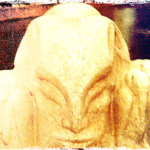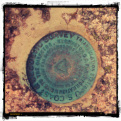Andrew Furst's Blog, page 148
January 26, 2015
Dialectic Two-Step – Is There No Good Without Evil?
 Dialectic Two-Step is an ongoing series of my thoughts on questions that come my way.
Dialectic Two-Step is an ongoing series of my thoughts on questions that come my way.Wisdom lies neither in fixity nor in change, but in the dialectic between the two. – Octavio Paz
Question: Are Good and Bad separate things? Is it true that there is no good without evil?
Response: No good without evil? Good and the absence of good (evil?) are opposites on a continuum. I think we need to have the complete picture of good and evil to clearly see their relationship.
Goodness and evil come in shades. This is captured in language as relative superlatives; good, better, and best. The nature of internet comment threads show that good is something that we each perceive uniquely. It seems obvious that Charles Mason and Jesus would have very different opinions on what good is and where actions might fall on the spectrum.
Everyday experience tells us that goodness is a matter of perspective. Take as an example a situation with three people; a bystander and two people in an argument. One of the quarrelers makes a particularly insulting remark. The other, angered, strikes out and causes physical harm.
The bystander may feel that while both parties wronged the other – i.e. they were both low on the good index – one of them did more wrong (or evil). At the same time, each feels they were justified in their actions and don’t see themselves as evil at all. Each person has a very different perspective on what happened.
I’m sure you can recall similar experiences in your life where you may have been in one or more of these roles. Recall your inner experience in the conflict and how the others obviously felt different. Each person’s view of the good and evil in a situation is going to differ. Conflict is the function of disparate moral views, not just a binary disparity (good OR evil), but a disparity along a spectrum.
Good and evil are entirely subjective. The terms good and evil describe our inner experience in relationship to our perceptions. They do not exist outside of our inner experience.
There is of course a desire to externalize good and evil. This is a very good thing. We can and do agree on shared values. These values allow us to move beyond the fear and distrust that unbridled lust, anger, and aggression breeds. These shared values form the basis of our social contract.
To summarize, here are three important points on good and evil:
First the ideas of good and evil are products of the minds effort to make sense of experience. They do not exist outside the mind.Second as mental formations good and evil are relative to each other. They are two ends of a linguistic continuum.Finally, external notions of good and evil are linguistic. They are shared values that offer mutual benefit to a community of individuals. But, they do not exist outside of the realm of the mind.So, yes I do believe that good cannot exist without evil. To use Thich Nhat Hanh’s language, good is interdependent with evil.
Get Each Week's Dialectic Two Step in your email boxFirst Name:
Last Name:
Email address:
Select a Weekly Series You'd Like to Follow:
One Minute Meditations
Tiny Drops (Photography series)
Compass Songs (My Favorite Poems)
Dialectic Two-Step
Modern Koans (interesting questions)
Sunday Morning Coming Down (Music Videos)
Relics (Timeless Republished Articles)
The post Dialectic Two-Step – Is There No Good Without Evil? appeared first on Andrew Furst.
January 25, 2015
One Minute Meditation – Dragon Brook – Part I
 One Minute Meditations is an ongoing series of short videos, poems, and commentary intended as a meditation. Offered as an opportunity to step back from your cyber routine and settle into a more natural rhythm, if only for a minute. Dragon Brook – Part I
One Minute Meditations is an ongoing series of short videos, poems, and commentary intended as a meditation. Offered as an opportunity to step back from your cyber routine and settle into a more natural rhythm, if only for a minute. Dragon Brook – Part I
(Note: This meditation was originally published last year)
Sometimes everything can be going your way. When you need something, it can just show up at the right time. Other times it seems like life has left you behind. You can only stand there and watch as it moves on without you.
I took a set of videos in Shelburne Falls, Massachusetts near the home of our dear friends Lisa and Andi. It is footage of Dragon Brook. In this version the brook is racing towards you through the cold and ice.
The perspective gave me the feeling that I was in the position of receiving the gifts of life. The water and its energy feeding me.
In this weeks meditation, remember that receiving the gifts of life is often a matter of getting out of your own way. Face the current and let it wash over you, nourish you, and bring you everything you need.
Is Giving Better Than Receiving?Giving is a door
that you open to receive
Let the gifts be shared
First Name:
Last Name:
Email address:
Select a Weekly Series You'd Like to Follow:
One Minute Meditations
Tiny Drops (Photography series)
Compass Songs (My Favorite Poems)
Dialectic Two-Step
Modern Koans (interesting questions)
Sunday Morning Coming Down (Music Videos)
Relics (Timeless Republished Articles)
The post One Minute Meditation – Dragon Brook – Part I appeared first on Andrew Furst.
Sunday Morning Coming Down – Indian Summer
 Sunday Morning Coming Down is an ongoing music video series. The songs fit my definition of music for a lazy couch bound Sunday morning.
Sunday Morning Coming Down is an ongoing music video series. The songs fit my definition of music for a lazy couch bound Sunday morning.Indian Summer by LunaGet Each Week's Sunday Morning Coming Down in your email box
First Name:
Last Name:
Email address:
Select a Weekly Series You'd Like to Follow:
One Minute Meditations
Tiny Drops (Photography series)
Compass Songs (My Favorite Poems)
Dialectic Two-Step
Modern Koans (interesting questions)
Sunday Morning Coming Down (Music Videos)
Relics (Timeless Republished Articles)
Breakfast in cemetery
Boy tastin’ wild cherry
Touch girl, apple blossom
Just a boy playin’ possum
CHORUS
We’ll come back for Indian Summer
We’ll come back for Indian Summer
We’ll come back for Indian Summer
And go our separate ways
What is that cheerful sound?
Rain fallin’ on the ground
We’ll wear a jolly crown
Buckle up, we’re wayward bound
CHORUS
Motorbike to cemetery
Picnic on wild berries
French toast with molasses
Croquet and Baked Alaskas
CHORUS
Cover me with rain
Walk me down the lane
I’ll drink from your drain
We will never change
No matter what they say
The post Sunday Morning Coming Down – Indian Summer appeared first on Andrew Furst.
January 24, 2015
Relics – It Ain’t Easy
 The Relics series are throwback articles from previous years. They seem timeless enough to be relevant today.
The Relics series are throwback articles from previous years. They seem timeless enough to be relevant today.It Ain’t EasyTry as you will, you cannot annihilate that eternal relic of the human heart, love. – Victor Hugo
The winter season is rich in metaphors. One that comes to mind today is how we try to suspend the self in time like freezing water to ice. Water as a liquid is fluid, adaptable, and powerful. As ice it is unyielding, brittle, and poses challenging barriers to life. When we adopt hardened habits, we become brittle and separated from the joys of living. The Buddha described the self as a gradually solidifying pattern of being that is at odds with the flowing change of real life. He identified it as the root cause of suffering. He taught anatta, or not self. He reminded us it’s not all about me.
Change is HardAt work, I’ve been involved in a major transformation in how my department does business. I’m in software and the shift we’re making is to a process call Agile or Scrum. It’s a team approach to getting software done. The transition has produced a lot of anxiety. It’s a perfect example of how the real world of change can clash with our desire to keep things the same.
The process of moving to agile has been something of a “cruel” social experiment. Before my team went through the formal training, I asked them to try the agile method as a means to prepare for it. The hallmarks of agile are a few key milestones; a planning meeting, a daily 15 minute stand up called a scrum, a review, and a retrospective meeting. Each meeting has a fairly brief and prescribed agenda. In that framework I asked them to work as a team to examine how they would have to shift doing business. The result was predictable. All of us did a little freak out. Making the change seemed like it would be completely overwhelming.
Suffering of SufferingI think the anxiety that surfaced had a few sources. First was the apprehension that came with piling on a new process. We were already struggling to keep pace with the needs of a rapidly growing company. Now we were adding something new to the mix.
 This is a typical life problem. The facts are just tough; with limited resources we have to somehow keep up with the growth of the business, scale our current systems, add new ones, and respond to new opportunities. This is an example of what the Buddha called the suffering of suffering. This is real world pain. We can’t escape it. But we should try to avoid suffering any more than we need to.
This is a typical life problem. The facts are just tough; with limited resources we have to somehow keep up with the growth of the business, scale our current systems, add new ones, and respond to new opportunities. This is an example of what the Buddha called the suffering of suffering. This is real world pain. We can’t escape it. But we should try to avoid suffering any more than we need to.
What are our choices? We can continue to do business as usual or change. If the old way of doing business doesn’t solve the problems we’re having, shouldn’t we alter course?
Of course, but our people are tired, worn out and getting a little emotionally fragile. Why would we choose to add another thing to their plate? We chose to change because repeating the same thing over and over is unlikely to produce different results.
If we want to suffer less, we need to change.
Suffering of ChangeRemarkably, just the idea of change is a major challenge. When people have engaged in a process for many years and they’re asked to abandon it, there is significant work required to extinguish the old patterns of behavior. The patterns are familiar, predictable, and comforting. When they’re taken away, the first question that comes up is was what are the new rules?
The agile process is something of an awakened approach to building software. It looks for teams to self-organize. They’re asked to observe and adapt. When an issue arises, the process doesn’t prescribe a fix. It looks to the team to work together to solve the problem. Rather than positing a one size fits all solution, it asks people to open their eyes and apply their experience, skills and powers of observation to resolve the issues.
In essence Scrum asks that people wake up! Like most change, it sounds simple, but it’s not easy. If it were, we’d all be enlightened beings capable of responding flawlessly to each situation. I don’t think we can call our shift to agile flawless. This move has demonstrated to me that it will take a lot of personal work to make this a success.
Suffering of ConditioningWhere I see the most resistance to the change is where the principles of the new method are in conflict with the old way of doing business. I see this show up in two ways:
The Old Way Was Better
We’ve converted to Agile to address a number of problems that the old way of doing business failed to resolve. While we have a broad consensus that we need to change , if you were to observe how we’ve performed, you’d think otherwise.
In daily scrum meeting the process prescribes, there is a very precise agenda and a 15 minute time box. We have a new software engineer who recently joined us who has had experience with Agile before. On several occasions, he has politely redirected me back onto the agenda, and I’ve been a little gruff in response.
In the moment, especially when there is a challenge, I’ve often reverted to the old way of doing things. When someone points out my regression, I get defensive. I take it personally.
This is the suffering of conditioning. I am attached to the old patterns of behavior. So much so, that I take offense when I’m reminded that those methods have failed repeatedly in the past. The old patterns have become part of me. When someone points out I’m drifting into habit, I read this as an attack on me. The Buddha said, “Not So.” He said Anatta – not self.
I Want a New Delusion

The other thing that comes up is the desire to establish a new set of prescribed solutions. The perception is; if we’re asked to adopt a new system, shouldn’t the new system tell us what to do to get it right. Agile says no, each situation is different enough that a pat response is unlikely to be effective.
This is what I like, and dread, about the agile approach. It really doesn’t have a lot to say about how to solve problems or how to do it right.
One of my new Scrum Masters summed up the gap nicely, “If you say self organize to me one more time, I’ll….”. I empathize with her a great deal. I’m a process guy. This is hard.
I don’t see any evidence that Scrum’s founders Ken Schwaber and Jeff Sutherland are Buddhist, but I see hints of the Buddha’s teachings in the method. Rather than coming up with preconceived notions about how to solve problems (what I would call a replacement delusion), Scrum asks that the team be present. It asks that they observe and adapt. Ken and Jeff call this an empirical approach. I’ve always seen the Buddha’s approach to be just that.
It Ain’t EasyFor our transition to Scrum to be a success and for us to be able to rise to the challenge of keeping up with the company’s meteoric growth, we must be capable of responding and adapting to the change of real life.
The hardening of our delusion of self prevents us from being effective. It keeps us in a cycle of repeating the same process even though we get the same sub optimal results. We must thaw out our frozen patterns of being to overcome our difficulties and ultimately succeed.
Everyone wants change and nobody likes it. It Ain’t Easy.
Let’s hope we can wake up at work!
Get Each Week's Relics article in your email box
First Name:
Last Name:
Email address:
Select a Weekly Series You'd Like to Follow:
One Minute Meditations
Tiny Drops (Photography series)
Compass Songs (My Favorite Poems)
Dialectic Two-Step
Modern Koans (interesting questions)
Sunday Morning Coming Down (Music Videos)
Relics (Timeless Republished Articles)
The post Relics – It Ain’t Easy appeared first on Andrew Furst.
January 23, 2015
Modern Koans – Why Our Questions Are More Important Than Our Answers
 Modern Koans is an ongoing series that recognizes that good questions are often more important then their answers.
Modern Koans is an ongoing series that recognizes that good questions are often more important then their answers.The riddles of God are more satisfying than the solutions of man. ― G.K. Chesterton
Why Our Questions Are More Important Than Our AnswersWhat we observe is not nature itself, but nature exposed to our method of questioning – Werner Karl Heisenberg
Whatever a monk keeps pursuing with his thinking and pondering, that becomes the inclination of his awareness – Majjhima Nikaya 19
Free Your Mind and Your Ass Will Follow – George Clinton
Answers can be dreary, disappointing, limiting, and most importantly wrong. It can be argued by observing science, that all answers are wrong. Every theory that we’ve developed has room for improvement. In fact Kurt Gödel‘s Incompleteness Theorem proves that there will always be a gap between theory and reality.
So why bother? Well, there is progress. Humanity has benefited from the incremental success of the experimental method for hundreds of years now. Pacemakers, pharmaceuticals, space ships, modern agriculture, and the internet are the product of science’s relentless pursuit of answers. But I think there is something more important that we’ve gained from trudging on – better questions.
Werner Heisenberg uncertainty principle encapsulated how quantum theory introduced a mind shattering change to how we view the world. The intuitive idea that matter is solid was debunked, quantum field theory showed that all things arise and return to nothingness (Buddhist emptiness), quantum entanglement showed that oneness is not just a pretty idea. When Heisenberg suggested that we exchange the term experimentation with participation, he was telling us how important our questions are. How we observe (more precisely how we measure) the world affects what we are able to observe. The classic example of the principle is that if we measure the velocity of a particle, we can have some certainty about it, but we loose certainty about other attributes of the particle (location, spin, etc). Another way of putting it is if we’re interested in velocity, we’ll find velocity, but we loose site of location. The question we ask limits the answer.
Let’s look at some of the questions that are most prevalent today. Here’s whats trending on Twitter, Quora, and Facebook (I took this snapshot on January 20, 2015)
If these are our questions? What kind of answers are we going to find?
Are There Bad Questions?Another perspective on questions is whether or not we’ve learned what bad questions are. The Buddha was adamant about being silent on certain questions. These are called the unanswered questions. Different traditions call out varied questions.
What am I?Am I or Am I not?
Did I exist or not exist in the past?
What was I in the past?
Shall I exist or not in future?
What and how shall I be in future?
Whence came this person?
Whither will he go?
Is the world eternal or not?
Is the world (spatially) infinite or not?
Is the soul identical with the body or not?
Does the Tathagata (a perfectly enlightened being) exists, not exist, both, or neither after death.
There are few things common to these questions. They are unanswerable, because they lie outside observation. We cannot observe the past or future. These are only memories or anticipation. The question of what the self is lies at the center of Buddhism. Suffering itself is predicated on our misunderstanding of what we are – the problem of self. What’s more important about this mistake is that we cannot correct it.
In day to day life many of our critical questions are set up for failure because they’re not answerable.
Which political party’s platform will produce the best results for the future?What does God think about professional sports teams?What laws can we enact to ensure people act responsibility?How should we educate our children to ensure that they are successful?These are hard questions, in part because they don’t have answers. But are they bad questions? No, we have to answer them everyday.
So what do we do with them? How do we approach them? What expectation can we have after we’ve answered them? Can we and should we change our minds when things don’t turn out the way we hoped?
What do you think? I’d love to hear your thoughts in the comments section below.
Get Each Week's Modern Koan in your email boxFirst Name:
Last Name:
Email address:
Select a Weekly Series You'd Like to Follow:
One Minute Meditations
Tiny Drops (Photography series)
Compass Songs (My Favorite Poems)
Dialectic Two-Step
Modern Koans (interesting questions)
Sunday Morning Coming Down (Music Videos)
Relics (Timeless Republished Articles)
The post Modern Koans – Why Our Questions Are More Important Than Our Answers appeared first on Andrew Furst.
January 22, 2015
One Minute Meditation – Happy Time
 One Minute Meditations is an ongoing series of short videos, poems, and commentary intended as a meditation. Offered as an opportunity to step back from your cyber routine and settle into a more natural rhythm, if only for a minute.
One Minute Meditations is an ongoing series of short videos, poems, and commentary intended as a meditation. Offered as an opportunity to step back from your cyber routine and settle into a more natural rhythm, if only for a minute.
People who know me recognize my laugh. I’m a loud and frequent laugher. It broadcasts my presence immediately. I laugh easily and often. I’m extremely fortunate in this way.
I highly recommend it. In fact it has become one of my favorite meditations lately. In my book Western Lights, I offer a laughing meditation. I use it when I teach meditation quite frequently. This week’s video offers a quick short cut to a smile and it’s amazing power to open us up. I challenge you not to smile.
Wave Back and Smile
Solar motion toy
A Japanese cure for all
It’s happy time now
First Name:
Last Name:
Email address:
Select a Weekly Series You'd Like to Follow:
One Minute Meditations
Tiny Drops (Photography series)
Compass Songs (My Favorite Poems)
Dialectic Two-Step
Modern Koans (interesting questions)
Sunday Morning Coming Down (Music Videos)
Relics (Timeless Republished Articles)
The post One Minute Meditation – Happy Time appeared first on Andrew Furst.
January 21, 2015
Tiny Drops – Noticing
 Tiny Drops is an ongoing iPhoneographic series. The images represent moments of noticing on my part. For you, they are an offer to pause, observe, and take that noticing into your life. All photos are mine unless noted otherwise.
Tiny Drops is an ongoing iPhoneographic series. The images represent moments of noticing on my part. For you, they are an offer to pause, observe, and take that noticing into your life. All photos are mine unless noted otherwise. These works by Andrew Furst are licensed under a Creative Commons Attribution-NonCommercial-ShareAlike 4.0 International License.Noticing
These works by Andrew Furst are licensed under a Creative Commons Attribution-NonCommercial-ShareAlike 4.0 International License.Noticing
Click on images to view the full size slide show.
 fire filter
fire filter bikes filter
bikes filter garment district filter
garment district filter reflections on a van framed
reflections on a van framed snake filter
snake filter snowy stone wallGet Each Week's Tiny Drops in your email box
snowy stone wallGet Each Week's Tiny Drops in your email boxFirst Name:
Last Name:
Email address:
Select a Weekly Series You'd Like to Follow:
One Minute Meditations
Tiny Drops (Photography series)
Compass Songs (My Favorite Poems)
Dialectic Two-Step
Modern Koans (interesting questions)
Sunday Morning Coming Down (Music Videos)
Relics (Timeless Republished Articles)
FIVE LIMITLESS THOUGHTS
May all living beings have happiness and its causes
May all be free from unhappiness and its causes
May all dwell in equanimity, free of attraction and aversion
May all quickly find the great happiness that lies beyond all misery
May all enjoy inner and outer peace now and forever
NAMO AMITOFOThe post Tiny Drops – Noticing appeared first on Andrew Furst.
January 20, 2015
Compass Songs – e.e. cummings – One winter afternoon
 Compass Songs is an ongoing series of works by poets that I enjoy. Poetry, as the Zen Masters have said, is like a finger pointing to the moon. It speaks the unspeakable.
Compass Songs is an ongoing series of works by poets that I enjoy. Poetry, as the Zen Masters have said, is like a finger pointing to the moon. It speaks the unspeakable.
One winter afternoon
( at the magical hour
when is becomes if )
a bespangled clown
standing on eighth street
handed me a flower.
Nobody, it’s safe
to say, observed him but
myself; and why? because
without any doubt he was
whatever (first and last)
most people fear most:
a mystery for which i’ve
no word except alive
— that is, completely alert
and miraculously whole ;
with not merely a mind and a heart
but unquestionably a soul –
by no means funereally hilarious
(or otherwise democratic)
but essentially poetic
or etherally serious :
a fine not a coarse clown
(no mob, but a person)
and while never saying a word
who was anything but dumb;
since the silence of him
self sang like a bird.
Most people have been heard
screaming for international
measures that render hell rational
— i thank heaven somebody’s crazy
enough to give me a daisy
Get Each Week's Compass Song in your email boxFirst Name:
Last Name:
Email address:
Select a Weekly Series You'd Like to Follow:
One Minute Meditations
Tiny Drops (Photography series)
Compass Songs (My Favorite Poems)
Dialectic Two-Step
Modern Koans (interesting questions)
Sunday Morning Coming Down (Music Videos)
Relics (Timeless Republished Articles)
The post Compass Songs – e.e. cummings – One winter afternoon appeared first on Andrew Furst.
January 19, 2015
Dialectic Two-Step – Suffering Has Helped You Become Who You Are?
 Dialectic Two-Step is an ongoing series of my thoughts on questions that come my way.
Dialectic Two-Step is an ongoing series of my thoughts on questions that come my way.Suffering Has Helped?Wisdom lies neither in fixity nor in change, but in the dialectic between the two. – Octavio Paz
Question: How has suffering helped you become who you are?
Answer: Evolution is the process of selecting adaptive responses to our environment. Those species more capable of responding to the environment survive and reproduce.
As human beings, we have benefited fabulously from this brain of ours. It stores memories, which are fodder for learning. By reflecting on our past, we can develop adaptive responses to suffering quickly. Suffering is the trigger. Beings capable of recognizing the signal of suffering and learning adaptive responses to it will overcome.
I am what I am because of nature and nurture. I have the terrific advantage of having human DNA (nature), which in turn endows me with a brain to learn (nurture). Recognizing and responding to the signal of suffering is the lynch pin in both of these processes. Suffering Has Helped You Become Who You Are.
Get Each Week's Dialectic Two Step in your email boxFirst Name:
Last Name:
Email address:
Select a Weekly Series You'd Like to Follow:
One Minute Meditations
Tiny Drops (Photography series)
Compass Songs (My Favorite Poems)
Dialectic Two-Step
Modern Koans (interesting questions)
Sunday Morning Coming Down (Music Videos)
Relics (Timeless Republished Articles)
The post Dialectic Two-Step – Suffering Has Helped You Become Who You Are? appeared first on Andrew Furst.
January 18, 2015
One Minute Meditation – Fosters Pond Dam
Fosters Pond Dam An Excerpt from “Spring Melt” by Katherine Bode-Lang We pull the muck of winter from the gutters, hope the water runs clean again; nothing more than this: read the rest of the poem here (Note: This meditation was originally published last year) Turning the corner to spring, my hopes are modest but they are […]
The post One Minute Meditation – Fosters Pond Dam appeared first on Andrew Furst.




